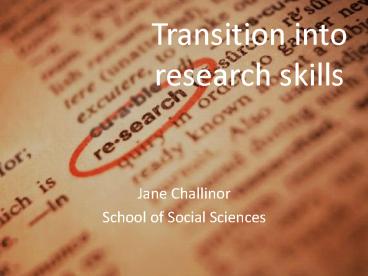Transition into research skills - PowerPoint PPT Presentation
Title:
Transition into research skills
Description:
Transition into research skills Jane Challinor School of Social Sciences Stereotype of student carrying out research at University Where we want/ need them to be ... – PowerPoint PPT presentation
Number of Views:94
Avg rating:3.0/5.0
Title: Transition into research skills
1
Transition into research skills
- Jane Challinor
- School of Social Sciences
2
Stereotype of student carrying out research at
University
3
Where we want/ need them to be researching?
4
On line searching requires new skills
5
Building skills.. ..from the
inside
6
(No Transcript)
7
Stage 1 First go to the Diigo group site and
choose ONE article which you are going to use as
your starting point. You should read this
article and make notes identifying the main
themes. Stage 2 Next you should identify key
words associated with this article and use these
as search terms. Enter these search terms into
e-search to identify a further two related
articles. In Stage 3, once you have collected
your resources, you should read through or
watch/listen to these and once again make notes
about the key themes. Stage 4 - This is where
you start to evaluate and analyse each of the
sources you have read. What research is it based
on? What is the aim of the author? How convincing
or valid are the arguments used? How does the
conclusion differ from or how similar is it to
another resource?
8
- Stage 5 start to structure your essay. Create a
title or question which your essay should answer - You should start with a short and concise
introduction which tells the reader the theme of
your essay, the main areas you are going to
explore and, briefly, what your conclusion will
be. - The main body of your essay should compare and
contrast the articles you have used as your
sources. This is not about simply DESCRIBING what
each article has said, but pulling out the main
arguments and evaluating them. - Finally you should draw a conclusion from what
you have read. This is not just what YOU think
about the issue, it is the culmination of your
research and reading, your analysis of the
articles and your comparison of the different
views. - Stage 6 involves citing and referencing all your
resources correctly and compiling a Reference
List which will go at the end of your assignment.
9
Starting with bookmarked articles other web
based resources using DIIGO
10
Screen Capture tutorial on using Library One
Search
11
A first step towards designing a research
question ..
http//www.flickr.com/photos/niznoz/
12
(No Transcript)
13
More support step by step audio/video reminders
on structure, referencing, research strategies
14
More support step by step audio/video reminders
on structure, referencing, research strategies
15
http//www.flickr.com/photos/r-butler/
- Outcomes
- module evaluation
- students assignments
16
http//www.flickr.com/photos/r-butler/
- Outcomes
- module evaluation
- students assignments
17
(No Transcript)
18
(No Transcript)
19
(No Transcript)
20
(No Transcript)
21
(No Transcript)
22
http//www.flickr.com/photos/r-butler/
- Outcomes
- module evaluation
- students assignments
23
Mature student (access to HE course) mid 1st
class
24
Traditional (lt21 yrs) student, straight from
school mid 22
25
Referencing is something I had never needed to
use before therefore I found this area of
academic writing a huge challenge and indeed time
consuming. Although I do recognise the need for
this. I have found this difficult to grasp and
hopefully over the forthcoming years I will find
much easier to do. Reading journal articles I
have found to be quite difficult and have felt I
have not grasped this way of reading correctly.
This is something I would definitely like to
enhance and hopefully I will learn to do
effectively..
Final portfolio reflections on the year.
26
the module has helped me develop my research
skills by learning about different methods of
collecting data, writing styles, analysing
findings and organising workloads to understand
literature by breaking it down to easily get a
better understanding. The research skills I have
developed from this module have widened my way of
using IT in order to achieve valuable outcome and
interesting ways of researching.
. and on the module Mature student returning to
study after 10 year gap































